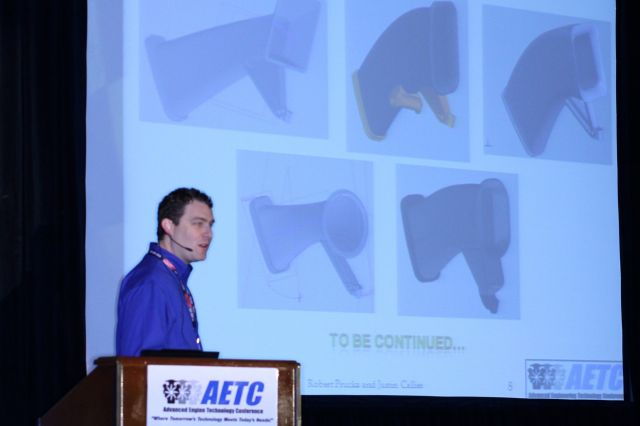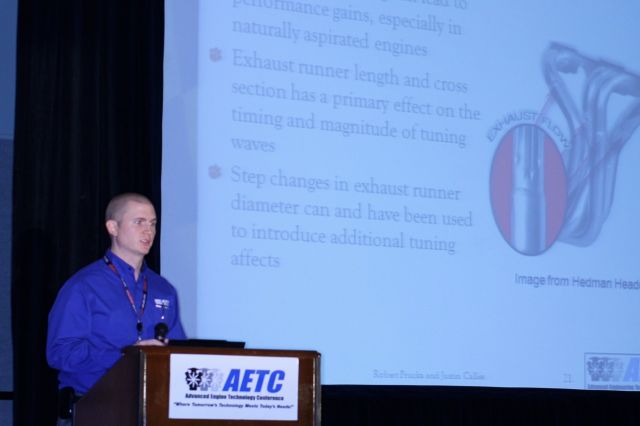A professor and his doctoral student demonstrated the powerful potential of engine simulation tools, but also reminded the audience that hurdles remain for quick evaluation of the tremendous data generated by the computer.
Dr. Robert Prucka, assistant professor in the mechanical engineering department at Clemson University, made his presentation to the Advanced Engine Technology Conference (AETC) along with Justin Callies, who is working towards his Doctor of Philosophy in Automotive Engineering at Clemson’s International Center for Automotive Engineering (CU-ICAR).
“[Simulation] is like another wrench in the toolbox,” Prucka says.
Prucka’s talk focused on experiments with intake manifold design. Airflow was the main topic as simulation provides insights that can’t be found on a flow bench. In one example, Prucka showed a simulation of a single injector spray in a proposed manifold design.
“We track every droplet, how they move, how they break up,” explains Prucka, noting just a few milliseconds of simulation generates 50 gigabytes of data. “A human can’t look at that in a lifetime, so we need to quickly figure out ways to analyze the data.”
With each change or iteration in the simulation, engineers look not only at the direction and mass of the fuel spray, but location of wet spots, how the spray affects oil on the cylinder walls and how pressure waves influence the spray pattern. Engineers can run multiple tests to determine the best injection timing when related to piston travel.
“If we make changes, then what other factors have to be adjusted to reoptimize the combusiton?” asks Prucka. “We need to know if we did a better job or not.”
Shown are computer simulations of injector spray in a manifold design and evaluating stepped-header designs.
Simulation can clear up myths about engine dynamics.
“Does fuel evaporate better or worse if there’s high surface tension,” asks Prucka, noting that this particular scenario disregards surface heat. “You’d think it would be worse, that the surface tension would hold the droplets together. But it’s actually better because we found it changes the droplet shape and increases the breakup.”
Simulation can also show where in the incoming charge that the fuel is lean or rich throughout the cylinder, even at different times of the compression stroke.
“We care about the air-fuel ratio around the spark plug at, say, 30 degrees before TDC,” says Prucka. “This is the level of detail we can see in our simulation.”
Callies offered another demonstration of the simulation program in analyzing a stepped exhaust header. Again, detailed measurements of various air-flow dynamics were taken in fractions of a second throughout one exhaust pulse.
“Computing power is the bottleneck right now,” sums up Callies, echoing earlier comments about the massive data that just one simulation can generate and take up to five days to evaluate. “When you can look at everything, how do you know what to look at.”
Prucka also addressed issues racers may have with accuracy, adding that the new 3-dimensional software is “a lot closer to the real thing.” He also says to consider that NASCAR engines are making 900 horsepower, yet builders want to know within a half-horsepower if they’re making gains.
“A dyno isn’t that accurate,” reminds Prucka. “But 3D simulation is potentially that accurate.”





















